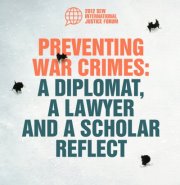
This week we review a forum on transitional justice in Sierra Leone, and a panel discussion at the Wheeler Centre that tackled the complex issue of international criminal law.
- Public Forum: The Success and Challenges of Transitional Justice in Sierra Leone
- Preventing War Crimes: A Diplomate, a Lawyer and a Scholar Reflect
Public Forum: The Success and Challenges of Transitional Justice in Sierra Leone
By Athena Rogers
To societies recovering from widespread human rights abuses, the horror and devastating extent of recent conflict may cause any attempt at justice to appear inadequate. Referring to the unprecedented violence of the twentieth century, Hannah Arendt once wrote that when “the impossible was made possible it became the unpunishable, unforgivable absolute evil”.
In 1991, ethnic conflict in Sierra Leone … left 75,000 dead, saw the recruitment of 5,000 child soldiers and completely destroyed 3,000 communities.
In 1991, ethnic conflict in Sierra Leone descended into similarly impossible levels of violence which left 75,000 dead, saw the recruitment of 5,000 child soldiers and completely destroyed 3,000 communities. Despite the unimaginable devastation that was suffered, the government of Sierra Leone and the international community immediately began devising transitional justice policies to address the wrongs of the past and to create possibilities for the future.
At a public forum held by the Castan Centre for Human Rights Law on 1 August 2012, Emmanuel Saffa Abdulai delivered a talk entitled “The Success and Challenges of Transitional Justice in Sierra Leone”. Abdulai worked as a lawyer for both the Special Court for Sierra Leone and the Truth and Reconciliation Commission that were established shortly after the country’s civil war.
… the key concern (in South Africa) was “how to bring victims together” and arrive at a reconciled society where “victims and perpetrators come together and get on with their lives”.
In speaking of the intentions of the two institutions, Abdulai evoked the language of South Africa’s experience of transition from Apartheid, claiming that the key concern was “how to bring victims together” and arrive at a reconciled society where “victims and perpetrators come together and get on with their lives”.
However, Adbulai by no means wanted to suggest that this was an easy task for either institution to achieve. He spoke insightfully of the difficulties in reconciling existing traditions and customs in Sierra Leone with the somewhat alien concepts of courts, trials and truth commissions.
Abdulai also discussed the various forms of resistance to the court that emerged, including the refusal of many lawyers to join the defence team, for fear of being seen as supporters of the groups blamed for the war. In spite of this, Abdulai showed that a commitment to the rule of law and due process could at times transcend ethnic and political tensions, as he himself served in the Office of the Principle Defender despite losing his only brother to the conflict.
Although he was able to demonstrate the many shortcomings and challenges that the Special Court faced, Abdulai also had a far more idealistic view of the Truth and Reconciliation Commission. He spoke of how it contributed to establishing peace in Sierra Leone via effectively bringing people together to share their stories. He cited a moving scene that he witnessed while working at the truth commission when a man whose arms had been cut off met the ex-child soldier responsible. Unable to remember what he had done having been injected with so much cocaine, the child instantly gave a heartfelt apology to the victim who agreed to forgive the child before running to embrace him.
While stories such as these are no doubt an important part of the work of truth commissions, they surely represent only a small number of cases. For many, discovering and investigating the crimes of the past with no intention to prosecute represents an institutionalised commitment to impunity and may, in fact, undermine the work of the courts. This tension between truth telling and justice is especially so in countries such as Sierra Leone, which have chosen to operate truth commission and trials simultaneously.
While more could have been said about the difficulties involved with Sierra Leone’s attempt to simultaneously punish the “unpunishable” and forgive the “unforgivable”, Abdulai’s talk was overall an excellent and rare insight into Sierra Leone’s transitional justice mechanisms.
Preventing War Crimes: A Diplomat, a Lawyer and a Scholar Reflect
By Gemma Leigh-Dodds
Cold weeknights don’t tend to get crowds easily, but on the evening of Thursday 2 August 2012, the Wheeler Centre was completely packed out. Hundreds filed into the oblong-shaped room and sat in rows like neat little sardines. You felt like there should’ve been an air hostess pointing out the lights on the aisle and the whistle to blow in the event of an emergency.
There were two reasons people had braved the cold. One was to support the relatively young not for profit group ‘SEW’, who aim to empower women in Tanzania by providing the means to make and sell bags, and who had organised the evening’s event as a fundraiser. The other reason was to hear three eminent speakers attempt to unravel the issues tied up with international criminal law. The glittery panel was made up by Professor Gareth Evans, Peter Robinson and Professor Gerry Simpson, with none other than His Honour Justice Simon Whelan of the Supreme Court of Victoria MCing the event.
… it is perhaps inevitable that the message the audience would come away with would remain “we’ve come so far, but there is a long way to go”.
To take the aeroplane analogy further (indeed, perhaps too far), the panel navigated what is often the very dense and bleak content of international criminal law. Their task was to assess how successful it has been to date, particularly noting the impact of the International Criminal Court. Gareth Evans spoke about the positive development of the responsibility to protect, or ‘R2P’. Peter Robinson, an international criminal defence lawyer, used the opinions of his high profile clients as a guide to unravel how much of a deterrent the system has been or was for them. Professor Simpson helped draw the strains together by analysing the historical roots and teething problems of the system.
Peter Robinson noted that progress was dependent on marrying rigorous debate with small individual acts, like buying a SEW bag…
SEW deserve kudos for providing the opportunity to hear what our brightest minds have to say, and for recognising international criminal law as an area the may evoke much passion and fascination. It must be noted that it seemed curious not to have any women on the panel, especially given the organisation that people had come to lend support to. I also felt the panel would have been assisted by a more guided topic, perhaps by being asked to use the recent Syrian experience to assess the efficacy of the international instruments. But it is perhaps inevitable that the message the audience would come away with would remain “we’ve come so far, but there is a long way to go”.
What else can be done when the international criminal system is still so infantile? Peter Robinson noted that progress was dependent on marrying rigorous debate with small individual acts, like buying a SEW bag, and indeed many stopped to buy a bag on their way out into the cold. Doing that, at least, helps to know you’re on the right flight.



